“I had to [explain she] could not find a second-hand crib because the CPSC basically outlawed” them [CPSC commissioner Nancy Nord, earlier here, here]
Posts Tagged ‘CPSIA and resale’
“I’m no longer comfortable posting publicly about CPSIA…”
A thrift store owner explains why. [Rick Woldenberg] More: Timothy Carney, Examiner.
Charity blue-jean donation program
It’s endangered by CPSIA, since organizers have no easy way to know whether a recyclable pair of kids’ jeans might have lead-containing brass in its buttons or zipper and thus be unlawful to sell (though not in fact dangerous). [Nancy Nord]
P.S.: Demise of print publication of Mothering Magazine after 35 years attributed in part to CPSIA and other CPSC regulations that devastated many advertisers [Handmade Toy Alliance]
CPSIA: “Kids’ Closet” no more
Kids’ used winter coats would have come in handy right about now: as part of his “CPSIA Casualty of the Week” series, Rick Woldenberg profiles Kids’ Closet of Rochester, Illinois, whose owner describes the law’s “devastating” effects on her shop. More on CPSIA and resale here.
CPSIA chronicles, September 12
- On Thursday Henry Waxman’s House Commerce Committee finally held its long-promised hearing on the Consumer Product Safety Improvement Act, the first such hearing by a committee with legislative jurisdiction since the calamitous law went into effect in February.
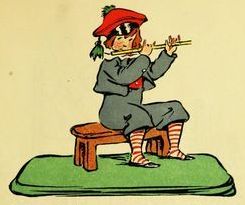 (The Small Business Committee, a panel with no legislative authority over the law, had gone first.) As noted last week, Thursday’s virtually dissent-free event hardly counted as much of a hearing, since Waxman turned down all pleas to allow testimony from actual affected businesses or other critics or victims of the law. Instead he called as his single witness recently appointed CPSC chair Inez Tenenbaum, who hewed closely to the line he (Waxman) wished to hear. A Washington Times editorial is appropriately scathing, and Rick Woldenberg has much more about the committee majority’s finger-in-ears response to the broad outcry over the law. Ranking Republican Joe Barton (R-Texas), who supported the law’s passage, did say that “we have all been inundated” with constituent messages about its ill consequences. The Handmade Toy Alliance has published the statement that Jill Chuckas of Crafty Baby would have made if invited to testify (more).
(The Small Business Committee, a panel with no legislative authority over the law, had gone first.) As noted last week, Thursday’s virtually dissent-free event hardly counted as much of a hearing, since Waxman turned down all pleas to allow testimony from actual affected businesses or other critics or victims of the law. Instead he called as his single witness recently appointed CPSC chair Inez Tenenbaum, who hewed closely to the line he (Waxman) wished to hear. A Washington Times editorial is appropriately scathing, and Rick Woldenberg has much more about the committee majority’s finger-in-ears response to the broad outcry over the law. Ranking Republican Joe Barton (R-Texas), who supported the law’s passage, did say that “we have all been inundated” with constituent messages about its ill consequences. The Handmade Toy Alliance has published the statement that Jill Chuckas of Crafty Baby would have made if invited to testify (more). - In an August 26 WSJ letter to the editor, Eric Havill of Branchport, N.Y. observes that Congress’s refusal to fix the law “is, if possible, even more irresponsible than the original legislation.”
- By a unanimous vote, the CPSC recently confirmed that Mattel, the giant toymaker whose many recalls helped touch off the lead-in-toys panic in the first place, has qualified for an exemption from third-party (outside lab) testing of its products under CPSIA, and can instead test in its own in-house labs. Of course, most of Mattel’s competitors are less fortunate and do not operate on a scale that will make such an exemption feasible. The exemption for “firewalled” in-house labs, deemed by one critic a “hall pass,” was something Mattel obtained through intense lobbying back when the law was under consideration. Like the other giant in the business, Hasbro, Mattel actively lobbied for CPSIA’s passage, and even as the law has brought undreamt-of woe to thousands of smaller producers of kids’ products, the two big companies seem to be doing rather well under it. More: Timothy Carney, Washington Examiner; Brad Warbiany, Liberty Papers; Christopher Taylor, Word Around the Net. Other reactions to the exemption: Holly Jahangiri, Rick Woldenberg, Ed Morrissey/Hot Air (“one of the companies that created the problem in the first place has gotten a waiver”), Katherine Mangu-Ward/Reason (“Mattel now has a cost advantage on mandatory testing, and a handy new government-sponsored barrier to entry for its competitors”), Handmade Toy Alliance.
- What’s going to replace forbidden phthalates in kids’ products now that CPSIA has banned them? Probably alternative plasticizing chemicals about which we know less, notes Andrew Langer in Roll Call.
- It’s old news, of course, that the CPSC asserts the power to go after eBay and Craigslist sellers, church bazaars, homeowners who hold yard sales and other sellers of used items that do not comply with CPSIA and other safety standards (although evidence is very sparse that most members of Congress actually realized the law would reach sales of those kinds.) Last month the CPSC saw fit to announce “Resale Roundup”, a new crackdown on secondhand sales. It also revised its book of guidance for resellers, in ways Rick Woldenberg finds less than enlightening. Discussion: Adler/Volokh, Ed Morrissey/Hot Air (“What did we ever do before the CPSIA protected the US through its throngs of federal nannies? How did we ever survive garage sales in the past 233 years?”), Washington Times (“from yard sales to jail cells”), Katherine Mangu-Ward/Reason, John Stossel, Deputy Headmistress/Common Room (“Remember when Congress assured us that the little guys had NOTHING to worry about with the CPSIA because they weren’t going to come after us? They. Lied.”) On the brighter side, McClatchy’s James Rosen quotes spokesperson Scott Wolfson as saying the commission isn’t planning to seek admittance to inspect private homes and garages to enforce the law. So be thankful for small favors.
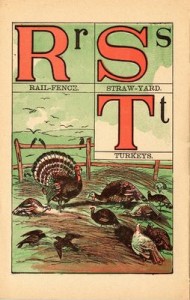
PUBLIC DOMAIN IMAGES from Ethel Everett, illustrator, Nursery Rhymes (1900), and (illustrator not known) Farm Yard ABC (c. 1880), both courtesy ChildrensLibrary.org.
CPSIA, kids’ resale and the Times, cont’d
The New York Times, which to the amazement of many has printed scarcely a word about the catastrophic effects of the law it still defends, now runs a Fashion & Style story applauding what it identifies as a trend among affluent urban parents toward buying used products for their kids rather than always insisting on new (Sarah Wildman, “For Firstborns, Secondhand Fits the Bill“). But it never mentions the reason why those parents will find the selection of kids’ goods around the nation’s thrift shops to be much, much sparser than it was a year ago.
Even as it spots this supposed trend, the paper does not quote anyone who works in an actual secondhand business; it does mention picking up used stuff free from “friends’ garages” and buying on Craigslist, where it’s easy to find sellers who don’t know (or at least claim not to know) that the law covers them too. You have to wonder what’s going on with the editors at this newspaper. Are they under some sort of orders not to mention CPSIA and its effects? Or do they just not know any better? (More: ShopFloor).
CPSIA and your tag sale
 Readers of this site may have known already, but the Kansas City Star spells it out for its readers: “the notoriously broad and confusing federal Consumer Product Safety Improvement Act applies to you and your front yard.” As the CPSC’s 27-page booklet for resellers (PDF) warns, “Ignorance of the law is no excuse.” Which is especially problematic since even if you do study up on it, as Adele Meyer, executive director of the National Association of Resale and Thrift Shops, reminds us, “the way it was written, it’s almost impossible to abide by this law.”
Readers of this site may have known already, but the Kansas City Star spells it out for its readers: “the notoriously broad and confusing federal Consumer Product Safety Improvement Act applies to you and your front yard.” As the CPSC’s 27-page booklet for resellers (PDF) warns, “Ignorance of the law is no excuse.” Which is especially problematic since even if you do study up on it, as Adele Meyer, executive director of the National Association of Resale and Thrift Shops, reminds us, “the way it was written, it’s almost impossible to abide by this law.”
CPSIA chronicles, May 15
Plenty of news in recent days: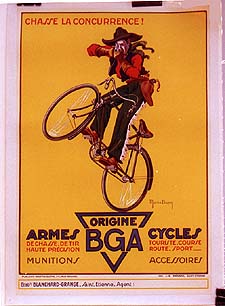
- Ordinary bicycles have now joined youth motorbikes and ATVs in the twilight status of not-quite-legal temporary toleration. That’s the impact of a unanimous (2-0) vote (PDF) by the Consumer Product Safety Commission granting the conventional bicycle industry a two-year stay but not exemption from CPSIA’s lead limits (earlier). Since everyday bikes unavoidably contain some lead that is potentially absorbable (if at infinitesimal levels), they are not legal, exactly, but the Commission promises not to go after anyone for selling them, for now. CPSC acting chair Nancy Nord:
We are compelled to deny the petition because the language of the statute does not give us the flexibility to do otherwise, even though our staff does not believe that lead exposure from using bicycles and related products presents a risk that they would recommend the Commission regulate. The risk assessment methods traditionally used by the Commission in evaluating exposure to lead are no longer available to us under the CPSIA.
Nevertheless, we also recognize, as we did when presented with a similar petition filed by the All Terrain Vehicle industry, that safety requires the presence of some lead in the metal used in the product to insure structural integrity. I am also mindful of the staff’s findings that the contact children may have with the parts of the products that contain lead is not extensive and would not present a risk as we have traditionally understood the term—that is, would not increase blood lead levels in any measurable way. Presented with the dilemma of inflexibility in the law vs the need for regulatory action that recognizes safety and good sense considerations, we are opting to stay enforcement.
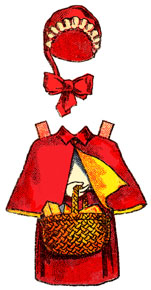
This course of action is becoming all too frequent for the CPSC. It is needed to avoid market disruptions and to protect consumers. However, it is not the optimal way to implement a statute. - On the other hand — and with potentially catastrophic consequences for businesses large and small — the commission by a 1-1 vote (Nord in favor, Thomas Moore against) turned down a stay (PDF) of the tracking label requirements due for August (earlier here and here). Much coverage at NAM ShopFloor, here (decisions on packaging, whether to etch numbers into products, etc. must be made with much lead time and manufacturers now face staggering costs if they guess wrong), as well as here, here, and here.
- Yesterday the House Small Business Committee held its long-awaited hearings, the first in either chamber since CPSIA took effect, on the law’s calamitous impacts on business. I haven’t had a chance to watch yet, but the House Small Business majority (Democratic) side has put up videos. The impression one gets from reform blogs is that 1) the hearing itself was pretty good but that 2) committee leadership then proceeded to ignore much of what was actually said and rally behind the Waxman line that there’s nothing wrong with the law itself, it’s just that the CPSC leadership hasn’t implemented it properly. [Carter Wood, Rick Woldenberg, Woldenberg’s submitted statement]
- Chalkydoodles has a two-part interview with founder Cecilia Leibovitz of the Handmade Toy Alliance: part I, part II (via ExUrbanis);
- CMMJaime takes a look at the CPSC’s new handbook for resellers, and finds its reassurances for small businesses subjective and vague, particularly when it comes to lines like: “Use your best judgment based on your knowledge of the product”.
- “Toy importer Rob Wilson’s company sometimes sells wooden children’s puzzles, but he hasn’t ordered one since last November.” That’s from the Metro-West Daily News in suburban Boston, which also has this ominous political bit:
McGovern [Rep. James McGovern, D-Mass.] said the federal agency is not being onerous, and businesses should work with it to resolve their worries.
In a written statement, Sen. John Kerry’s office said the measure is meant to keep dangerous products off the shelves, and it needs a chance to work before it is changed.
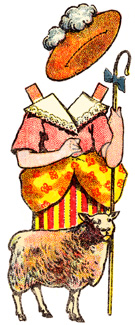
Public domain paper doll images courtesy Karen’s Whimsy.
CPSIA chronicles, May 11
- At long last a House committee — the one on Small Business — has announced a hearing on CPSIA’s impact on small business, to take place Thursday. (I’m almost hesitant to report this as good news since the last time I did so it took only hours for the event to be called off). The Small Business panel does not have primary legislative authority in the area; that is vested in Rep. Henry Waxman’s Energy and Commerce Committee, whose CPSIA-overseeing subcommittee has chosen instead to hold hearings on that very urgent subject of public concern, college bowl championships. Rick Woldenberg recalls the fingers-in-ears techniques the House has used to shut out unwanted information up to now: first Waxman/Rush staffers prearranged “hearings” that heard nothing, after which they (successfully up to now) maneuvered to make sure critics of the law would not obtain any official Hill forum at which to air their grievances as public outrage built.
- The Consumer Product Safety Commission has released new guidance (PDF) for thrift shops and other product resellers on compliance with CPSIA and other laws overseen by the agency. According to Ian at Musings at a Catholic Bookstore , the manual lays out policies that differ only slightly from what was known before, often by spelling out what will be made an enforcement priority, since the commission has no power to alter the law’s actual requirements. Thus it seems phthalates in older kids’ playthings, the kind unlikely to be placed in the mouth, are not going to be a high priority in reseller enforcement — which still doesn’t make it legal to resell those items. For many outside readers the biggest surprise seems to have been that the agency views its authority as extending to yard sales. As Ian notes, this isn’t actually news; it’s just that the new manual is spelling it out in a more visible way than it did at some earlier times.
- “Toy Story 3: Emperor Uncle Sam Puts You Out of Business” [Rep. Joe Barton (R-Tex.), The Hill]
- In the ongoing series of crises that is CPSIA, the next major crisis is due on or around August 14, as of which date newly made children’s goods must comply with new tracking and labeling requirements (touched on briefly in this space last month). The intent is to make it easier to trace and contain safety problems, enable recalls and so forth. For makers of children’s apparel, Kathleen Fasanella explains the complicated and sometimes expensive implications in posts here, here, and here. And apparel makers have it relatively easy, in part because they are already used to affixing permanent labels to most products, unlike many makers of items such as wooden toys and pencils, straw dolls, ceramic wall plaques, rubber spiders or bouncy balls, glass bead craft items, and so forth. Toy importer Rob Wilson writes, “this one clause will be enough to finish off a good majority of the companies that the other provisions of the law do not kill first. I personally know of many companies that are planning to close by August 15th if this provision is not amended.” The National Association of Manufacturers has requested (PDF) an emergency stay on the tracking and labeling rules; the CPSC has put off consideration of the request. Rick Woldenberg comments here and here. And tomorrow (Tues., May 12) at 1 p.m., the CPSC is holding a meeting, to which any interested member of the public is invited, to discuss the tracking and labeling rules. (Update: CPSC hearing is online as a webcast (h/t Woldenberg). Kathleen Fasanella has more, including links to more than 500 pages of protest letters, PDF, received by the CPSC on the issue).
- Cutting across multiple lines: per the Bulletin in Bend, Oregon, a local resident whose son got sick from salmonella (and recovered) appeared with Rep. Henry Waxman at a press conference to promote more effective federal food safety regulations; at the same time, though, “Christoferson said she can sympathize with the harm that poorly written rules can do to businesses” because her own resale store in the city of Bend, Stone Soup, has been harmed by CPSIA.
- Whimsical Walney, who has written with passion about the CPSIA fight, has announced that she is closing the doors of her children’s business.
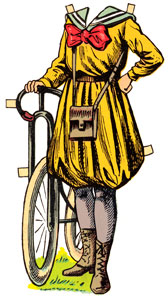
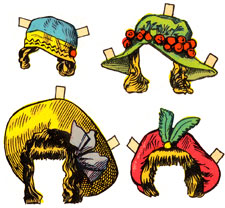
Public domain paper doll images courtesy Karen’s Whimsy.
“Your yard sale is illegal”
I’m reasonably sure that Katherine Mangu-Ward’s new Reason blog post on CPSIA is the only instance in which anyone has ever called me a “rock star”.
